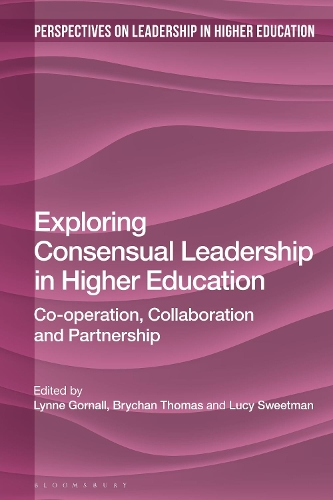
Exploring Consensual Leadership in Higher Education: Co-operation, Collaboration and Partnership
(Hardback)
Publishing Details
Exploring Consensual Leadership in Higher Education: Co-operation, Collaboration and Partnership
By (Author) Dr Lynne Gornall
Edited by Professor Brychan Thomas
Edited by Lucy Sweetman
Bloomsbury Publishing PLC
Bloomsbury Academic
26th July 2018
United Kingdom
Classifications
Tertiary Education
Non Fiction
Educational administration and organization
371.2
Physical Properties
Hardback
296
Width 156mm, Height 234mm
585g
Description
Exploring Consensual Leadership in Higher Education explores the idea that the nature of academic work is both creative and consensual. Higher education relationships, whether between managers, staff, learners or the public sphere, are at their most effective when rooted in partnership, teamwork, collaboration and collegiality. The term consensual is used because it situates new leadership models as structures based on consent, reflecting tacit traditions in education alongside ideas of leadership in other settings, including emerging industries. The aim is to celebrate achievements, encourage engagement opportunities, and add to the problem-solving knowledge-base. However, issues and problems in participatory engagement are also considered, and the borderlines between consensus (collective assent and agreement) and dissensus (widespread, serious, disagreement) are examined critically. The contributors offer a range of alternative perspectives on leadership, reflecting the diverse forms and ways of working practised in different national higher educational contexts and cultural settings. The volume incorporates a variety of approaches and points of view, including stories of leadership and change, innovation projects and case studies, key interviews and insights, and collective team writing.
Reviews
Highly relevant to academics working in managerial positions within universities ... A valuable contribution providing well-researched support for the key elements of consensual leadership and a timely reminder of the value of the approach. * JALT: Journal of Applied Learning & Teaching *
[In Exploring Consensual Leadership in Higher Education] each of the contributors offers insights into how the process of consensual leadership operates within a particular institutional and cultural setting. Together they build a persuasive and diversely documented argument in favor of a democratically grounded and culturally nuanced approach to intellectual leadership through dialogue, negotiation, and debateThis book will be of value to students in educational leadership, researchers, and teachers who have an interest in leadership based on cooperation, collaboration, and partnership that transcends the traditional boundaries of higher education. * Teachers College Record *
This book delightfully and skilfully breaks the mould of writing about leadership in higher education. It treats leadership as a relational concept rather than a set of management techniques. Rather than critiquing existing (and all too often failing) university leadership, it seeks boldly to develop new and exciting appropriate approaches. It does all of this this by drawing extensively on real life empirical examples from around the globe. This superbly articulated and structured volume constitutes an invaluable addition to new thinking on old problems. * Rebecca Boden, Professor and Director of New Social Research, University of Tampere, Finland *
Offers a much needed alternative to management, managerialism, and neo-liberal approaches to higher education leadership. The novelty of the book is not only its approach to academic work as both creative and consensual, but also its emphasis on the different ways cooperation, collaboration, and partnership are practiced across the world. Chapters from outside the Anglo-American centre offer invaluable knowledge about uneven power relations and geopolitics of knowledge in collaboration stemming both from colonial histories and present day hegemonies. One can only hope that the book will be read by higher education leaders. * Hanne Kirstine Adriansen, Associate Professor, Department of Educational Anthropology, Aarhus University, Denmark *
A magnificent book in so many different ways. Not much is known about working together' in higher education and this book delivers in spades with new ideas in every chapter. The book as a whole is diverse, innovative, comprehensive, forward looking, scholarly, grounded, dilemma exposing, critical, career-covering, nitty-gritty-like, impact-oriented, and downright impressive in its scope and imagination. A must read for anyone interested in higher education. * Michael Fullan, Professor Emeritus, OISE/University of Toronto, Canada *
Author Bio
Lynne Gornall is Leader of the Working Lives Research Team at the University of South Wales, UK. Brychan Thomas is Visiting Professor in Innovation Policy and Joint Leader of the Centre for Leadership, Innovation and Management Behaviours (CLIMB) at the University of South Wales Business School, UK. Lucy Sweetman is Senior Lecturer in Creative Writing at Bath Spa University, UK and a freelance writer and consultant.
